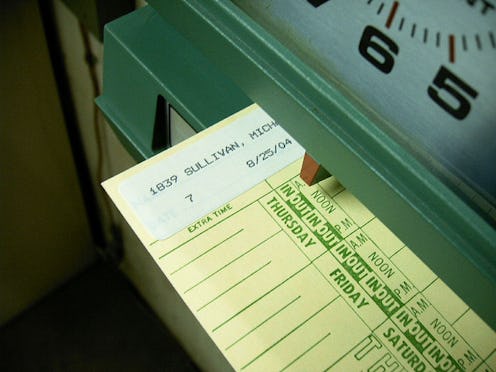News
Why The 30-Hour Workweek Works Better

Would a standard 30-hour workweek be healthier for us and the economy? Economist John Maynard Keynes famously predicted that technology would usher in 15-hour workweeks, and we'd all be fretting about too much leisure time by now. But as advances have made more of the old work possible with less effort, we've encountered (or created) new ways to fill work hours. Today, many people would tell you they dream of a 40-hour workweek. Cutting back even further seems like a beautiful, laughable idea.
But it's our current conception of work that's silly, according to a new book. In Time on Our Side , published by the New Economics Foundation (NEF), a diverse group of writers examine "why a 30-hour workweek would be a more rational, efficient, and sustainable approach" to the post-industrial economy. They argue that the current 40+ hour standard drives up stress, pollution and gender-based inequality. "If other economies are just as successful as the American economy and have markedly shorter hours — just look at Germany, for example — isn't there an argument there that you could do things differently?” co-editor Anna Coote asked Fast Company.
"Isn't there an argument there that you could do things differently?”
In our hyper-connected, increasingly productivity-obsessed culture, the idea of a mass cutting back of work expectations seems impossible. But Coote doesn't think so. In a 2012 TED talk, she made the case for a 21-hour workweek as the norm.
Even if this seems like a long shot, it's worth remembering that there's nothing natural or inevitable about today's 40, 50 or 60-hour work weeks (or about physically going to an office space). In a great article in Strike! magazine's summer issue this year, Davide Graeber explored "the phenomenon of bullshit jobs," without which he believes we would all be much closer to Keynes 15-hour-week vision. Basically, Graeber says we've ratcheted up the administrative hoopla surrounding everything, made most stuff more complicated than it needs to be and created a situation where a large swath of people believe large portions of their jobs are useless or meaningless (and they're probably right).
If you've ever worked in a meeting-happy office, you can probably attest to this. Heck, if you've ever worked in any office you can probably attest to this. And this, my friends, is why I work from home (teleworkers tend to put in more hours but also more productive hours). Between birthday parties, performance reviews and a workplace culture that values seeing people at their desks until some certain arbitrary hour — even if all they're doing is checking Twitter for the two-billionth time or shuffling paperwork around — many office employees wind up spending way more time at work than the actual work dictates.